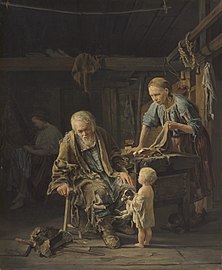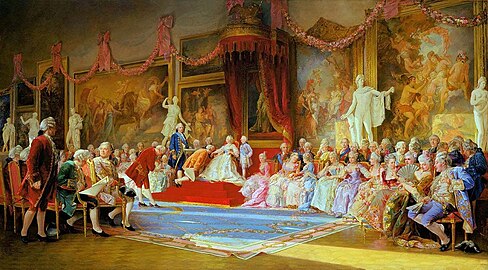Valery Jacobi
You can help expand this article with text translated from the corresponding article in Russian. (September 2016) Click [show] for important translation instructions.
|
Valery Jacobi | |
|---|---|
| Валерий Иванович Якоби | |
 Photography (1875) | |
| Born | Valery Ivanovich Jacobi 15 May [O.S. 3 May] 1834 |
| Died | 13 May 1902 (aged 67) |
| Education | Member Academy of Arts (1868) Professor by rank (1871) |
| Alma mater | Imperial Academy of Arts (1861) |
| Known for | Painting |
| Movement | Peredvizhniki |
| Awards | |
Valery Ivanovich Jacobi (Russian: Валерий Иванович Якоби or Якобий; 15 May [O.S. 3 May] 1834, Kudryakovo, Kazan Governorate, Russia - 13 May 1902, Nice, France) was a Russian painter[1] and an older brother of Pavel Jacobi (1842–1913), a notable revolutionary and ethnographer.[2][3]
Biography
Valery Jacobi was born to a family of an estate owner and started his education in the Kazan University, but broke off studying to enlist in the Russian Army[1] (Siberian Volunteer Corps[4]) during the Crimean War. In 1856 after retirement from the Army he decided to abandon his University studies and pursue an artistic career instead.[1]
In 1856-1861 he studied at the Imperial Academy of Arts, receiving a small gold medal for his painting "Serene Holiday of a Beggar" (1860). In 1861 he painted what may be his most notable painting "The Prisoner's Rest". In 1861-1869 Jacobi traveled to Europe with an Academy grant, visiting Germany, Switzerland, France and Italy.[1]
In 1870 Jacobi became one of the founding members of the Peredvizhniki art society. But in 1872 he was excluded for his failure to participate in a society exhibition[1] and his general disagreement with the ideals of the society.[4] Later he was considered a conservative, sceptical to the Peredvizhniki's ideas.
Jacobi was a member of the Imperial Academy of Arts after 1868, became a professor in 1871 and taught at the Academy from 1878-1889.[2] He lived mostly in Saint Petersburg creating historical paintings like "Jesters at the Court of Anna Ioanovna" (1872), "Ice Palace" (1878), etc. His works were criticized as purely decorative and lacking in substance.[4]
After a major reorganization of the Academy in 1891, he was dismissed and began dividing his time between Saint Petersburg, Algeria and France. Jacobi died in Nice in 1902.
Works
- Valery Jacobi's paintings
-
Serene Holiday of a Beggar (1860)
-
The Prisoner's Rest (1861)
-
Ninth Thermidor (1864)
-
Jesters at the Court of Empress Anna (1872)
-
Ice palace of Empress Anna (1878)
-
An Oriental Beauty (1881)
-
The Inauguration of the Academy of Arts (1889)
References
- ^ a b c d e Valery Jacobi in Krugosvet Online Encyclopedia (in Russian)
- ^ a b Valery Jacobi in Great Soviet Encyclopedia
- ^ Pavel Jacobi in Great Soviet Encyclopedia
- ^ a b c Valery Jacobi on Pointart library
External links
![]() Media related to Valery Jacobi at Wikimedia Commons
Media related to Valery Jacobi at Wikimedia Commons
- Members of the Imperial Academy of Arts
- Academic staff of the Imperial Academy of Arts
- Imperial Academy of Arts alumni
- Awarded with a large gold medal of the Academy of Arts
- 1834 births
- 1902 deaths
- People from Laishevsky Uyezd
- Peredvizhniki
- 19th-century painters from the Russian Empire
- Male painters from the Russian Empire
- Realist painters from the Russian Empire
- Expatriates from the Russian Empire in France
- 19th-century male artists from the Russian Empire







